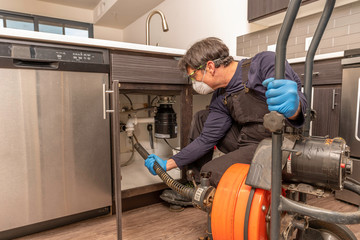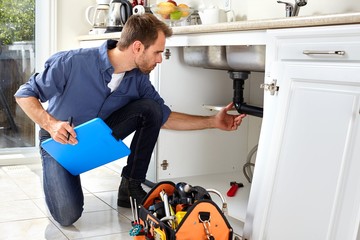Plumbing systems can be complex and require expert knowledge of tools and equipment. Therefore, it is important to hire a professional plumber. An expert plumber is a highly trained and skilled professional who can perform any plumbing job. Plumbers have the expertise to identify issues and suggest solutions that meet your needs and budget.

Plumbing is an essential part of modern life, from your bathroom faucets to your kitchen sink and even the water supply in your home. However, if you experience any trouble with your plumbing systems, the best thing you can do is to contact an expert plumber.
A professional plumber has years of experience in the plumbing industry, and they understand how to handle different types of problems. Their knowledge allows them to work efficiently and solve issues quickly.
Plumbers can help with everything from blocked drains and leaky faucets to broken pipes and roof leaks, so you’ll want to hire someone who knows what they’re doing when you need them. They also offer excellent customer service and will make sure you’re fully satisfied with their work.
In addition to their expertise, plumbers need to be licensed and insured. This ensures that they’re capable of performing work safely and won’t cause any damage to your property while working on it.
You can find out if the plumbing company you’re interested in hiring is licensed and insured by looking at their website or by calling their local state agency. You should also read online reviews to get a feel for their reputation and quality of work.
The rates that a plumber charges will vary depending on the type of work they perform. For example, a sink clearing will likely be less expensive than finding a slab leak or replacing your water heater, so it’s important to get a price estimate before deciding on who to hire.
If you’re buying a new home, it’s always a good idea to have a plumber check the property’s plumbing system before closing on it. This can save you thousands of dollars in the long run and avoid a huge headache down the road.
Plumbers are trained to interpret blueprints and 2 dimensional architectural drawings that indicate the layout of a house’s plumbing grid system. This knowledge makes it easier for them to determine which pipes go where and how they’re connected to other fixtures. This knowledge allows them to identify potential risks and hidden problems that you may not see with a surface-level inspection.
Plumbers are the professionals who work on home and business plumbing systems, repairing broken pipes and lines and installing new ones. They’re essential to society, as they work to ensure public health and sanitation. They also have specialized training to repair and upgrade a wide variety of other vital infrastructure, such as water supply, drainage, and gas lines.
Many vocational schools and community colleges offer programs that train candidates for the plumbing trade. These classes cover the basics of how to use tools and equipment, how to install and repair pipes, fixtures and appliances; as well as reading blueprints and understanding codes and regulations. They also provide in-depth training about OSHA safety and how to handle hazardous materials.
Alternatively, candidates can enter an apprenticeship program that provides hands-on training and classroom education. These apprenticeships last four to five years and are typically paid. They’re offered through trade unions, community colleges, and private businesses.
Some states require apprentices to complete a formal training program that includes 144 hours of classroom instruction each year plus 8,000 hours of supervised on-the-job experience over four years. These apprenticeships are a common way to learn the skills needed to become an expert plumber.
In order to get an apprenticeship, a candidate must have a high school diploma or GED certificate and meet other prerequisites. He or she must also have at least a working knowledge of basic math.
Once the apprenticeship period is completed, candidates can then pursue further education and obtain a license. They may need to pass an exam for the license, depending on their state. Most states have a progression of licensure levels, including apprentice, journeyman, and master.
Applicants must show proof of at least two years (4,000) of hands-on plumbing experience, or substitute directly related academic or technical training for up to one-half (2,000) of the experience requirement. They must also pass a technical exam and a business and law exam.
Once they’ve met all of their license requirements, candidates can begin working as a licensed plumber. In addition to demonstrating their competence, they must follow any rules and regulations set by the licensing agency. This can include completing continuing education courses to stay up-to-date with the latest developments in the field and how to keep their clients safe.
Getting licensed as a plumber is an important step towards working safely and efficiently in the plumbing industry. Most states require licensing before beginning any work. Licenses are issued by county and city governments to ensure that a plumber is competent in performing their duties.
Most states follow a progression of licensing stages based on education, experience, and the passage of exams. These stages include apprenticeships, journeymen, and masters. The process of becoming a licensed plumber can take years.
It is not necessary to have a college degree to become a plumber; however, completing a post-secondary education may help you obtain your plumber’s license and improve your job prospects. Community colleges and trade schools offer training programs for apprentices, journeymen, and master plumbers that cover everything from basic plumbing systems to codes and regulations.
Many states also require continuing education for licensed plumbers to ensure that they stay up-to-date on changing codes and procedures. Taking these courses can also help you demonstrate your expertise to potential employers and clients.
In addition to formal education, it is helpful for plumbers to talk with other plumbers about their careers. This will give you an idea of what it is like to work in the field and how they managed their career path.
Licensed plumbers need to abide by a code of conduct that requires them to respond promptly to notices and requests for information. Failing to do so can lead to severe consequences, including fines and license suspension.
If you are facing disciplinary action, it is important to contact a lawyer. They can assist you in negotiating with the board and filing an appeal if needed.
Some states also have reciprocal agreements that allow you to apply for a plumbing license in other states without having to complete an additional exam. Some of these licenses require a different set of qualifications than others, so it is important to research the licensing requirements in the state in which you want to work.
If you are interested in a career as a licensed plumber, start by looking for a company that provides excellent customer service. This will help you build a solid reputation and gain the trust of your customers. It is also a good idea to ensure that your company has proper insurance coverage. This will protect your business and the people who hire you.
Despite its mediocre rating of nebula sized staff, Expert Plumber is still on the job. Their attention to detail is exemplified in their customer service ethos. The company is a veritable gold mine of information regarding your needs. Whether you need to fix your toilet or install a new septic system, the experts at Expert Plumbing have you covered. They are open six days a week with an on call emergency response team of nine. Best of all, their phone number is on your lanyard, no matter where you are at the moment. They even make it fun to talk to a real live human on the other limb, thanks to their free no obligation quotes.


